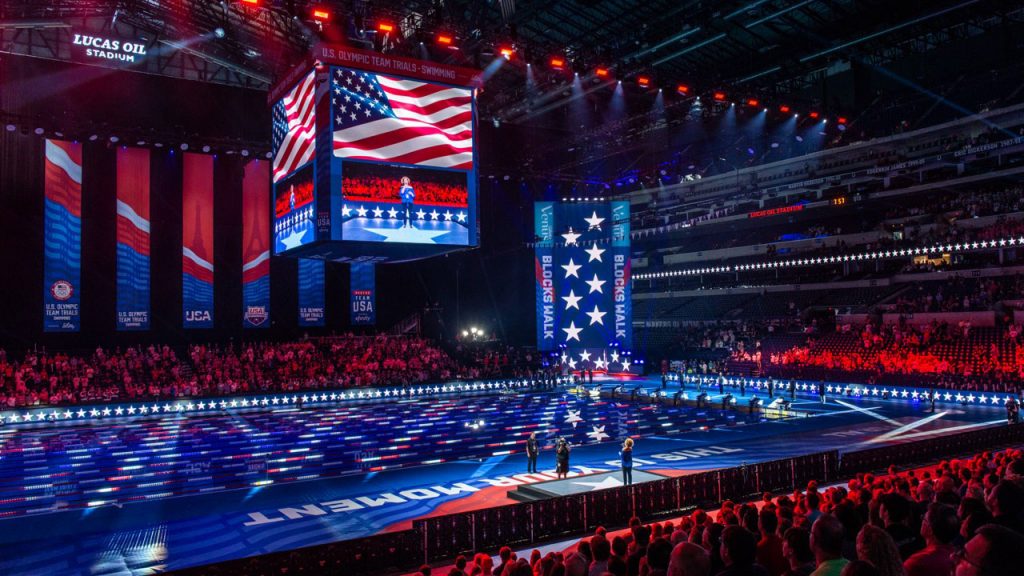
The USA 2024 Olympic Swim Trials transformed the Lucas Oil Stadium in Indianapolis into a state-of-the-art swim venue, building two Olympic-sized swimming pools within the stadium, separated by a partition. Caleb Cassler, Senior Audio Specialist from Dodd Technologies, Inc., created a converged network system that delivered the audio and visual aspects of the event. Cassler relied heavily on a robust and reliable network to support the event’s complex demands. To achieve this, he turned to Luminex as the backbone of its network infrastructure. The setup included an array of Luminex GigaCore switches: 20t, 10, 16XT, and 12. Each of these was configured and monitored using Araneo, during the Olympic Swim Trials.
Network Infrastructure and Setup
At the core of our network, we (Dodd) deployed two Luminex 20t switches, interconnected with redundant 10G links. These switches served as the central backbone, providing the necessary bandwidth and redundancy. From this backbone, the network branched out to several key locations:
- 1x GigaCore 10 switch was installed high up in the scoreboard above the pool, managing LED equipment and remote PTZ cameras. This switch provided redundancy for the system and was controlled remotely.
- 1x GigaCore 20t switch was dedicated to our Riedel Artist system hub, ensuring reliable communication throughout the venue.
- 3x GigaCore 16XT switches were strategically placed at key patch points, allowing each department to select their required VLANs as needed.
- 2x GigaCore 12 switches provided redundant Dante distribution for our Shure Axient equipment, along with distribution to the house system, as well as some ancillary I/O.
Technologies and Protocols in Use
A variety of protocols, including MA-Net and AES67, were employed to ensure smooth communication and signal distribution across the venue. Dante was used for input distribution, ensuring that audio signals were transmitted without interruption. Milan AVB supported the Meyer Sound PA distribution, delivering high-quality audio throughout the event.
The network also supported video camera PTZ control with PoE, computer control, and internet distribution; all managed seamlessly over the Luminex infrastructure.
Benefits of Using Luminex
Luminex proved to be an invaluable choice for our network needs. One of the standout benefits was the ease of use. The switches were straightforward to configure, and the ability to integrate various protocols—MA-Net, AES67, Dante, Milan AVB—without issue was key to quick and easy central control of the network. Having the ability to centrally set up all the VLANs with the appropriate settings for each transport type allowed us to focus on the show and not the network.
Luminex’s pre-vetted settings for audio and lighting transport were particularly helpful, allowing us to focus on the event rather than troubleshooting network issues.
Araneo, Luminex’s centralized monitoring and configuration tool (Araneo), was insanely important to our setup. It provided quick and easy central control of the entire network, enabling us to rapidly get everything up and running. This allowed each department to receive what they needed when they needed it, without delays or complications.
Challenges and Solutions
One of the biggest challenges we faced on-site was managing the long distances between various network points and the different transport types. The versatility of Luminex switches made it easier to handle these challenges, ensuring that all protocols coexisted harmoniously on the same network.
Another key challenge was maintaining network reliability. Given the critical nature of the production, any downtime would have been disastrous. The redundant links and the ability to remotely control the switches were vital in ensuring that the network remained stable and reliable throughout the event.
“We have trusted Luminex’s products for years on all our events, so it was a no-brainer to rely on their expertise again to transport the plethora of audio, lighting, and video content for this historic event,” remarked Caleb Cassler.




